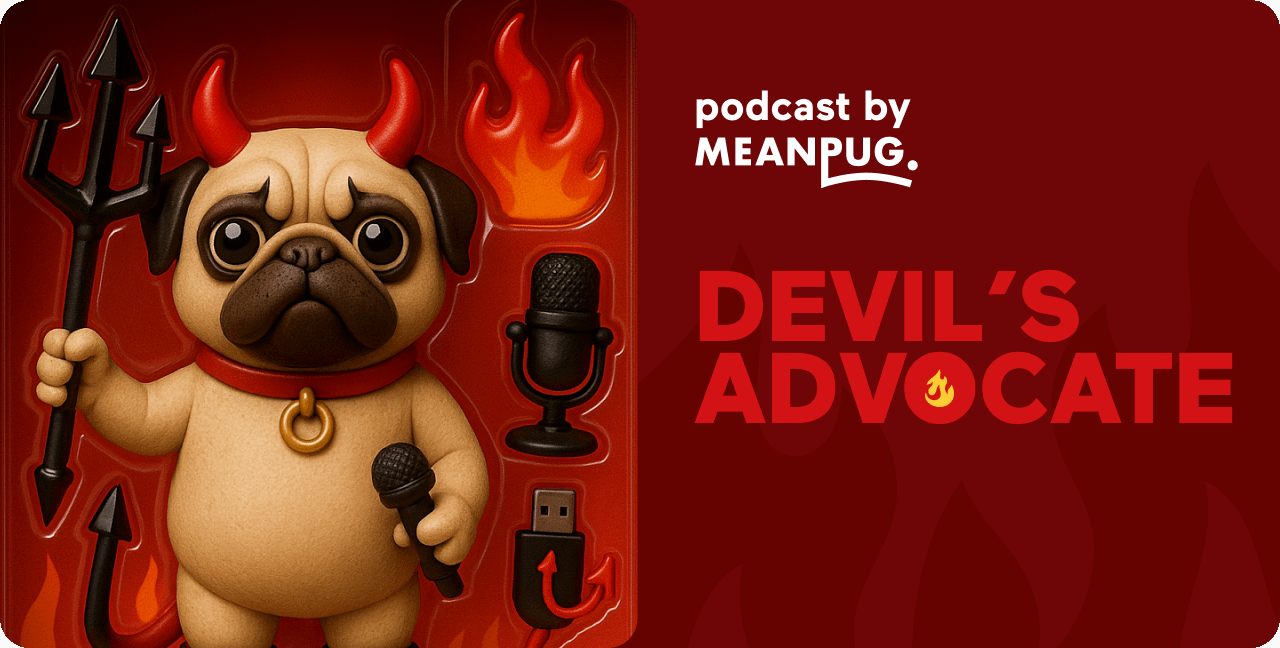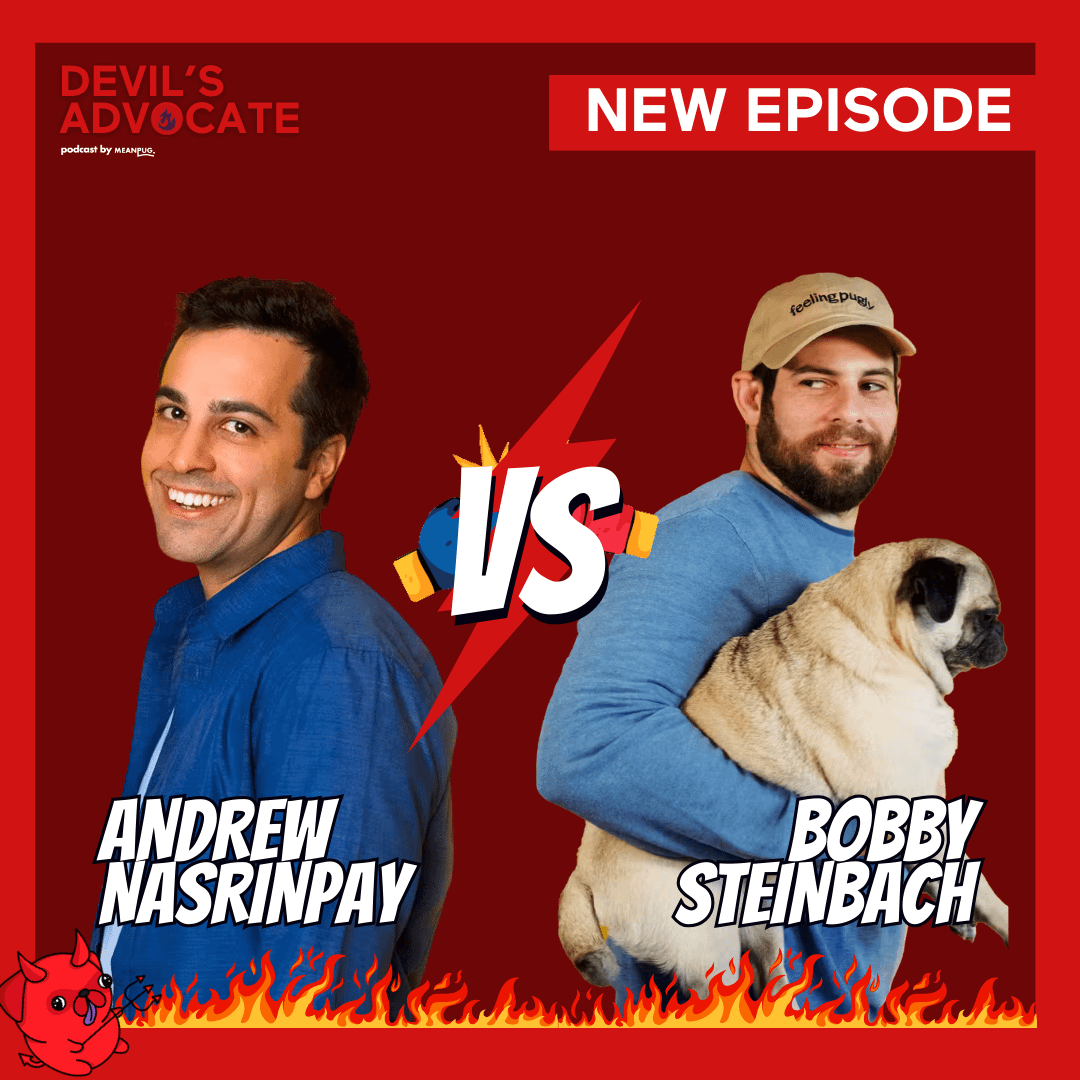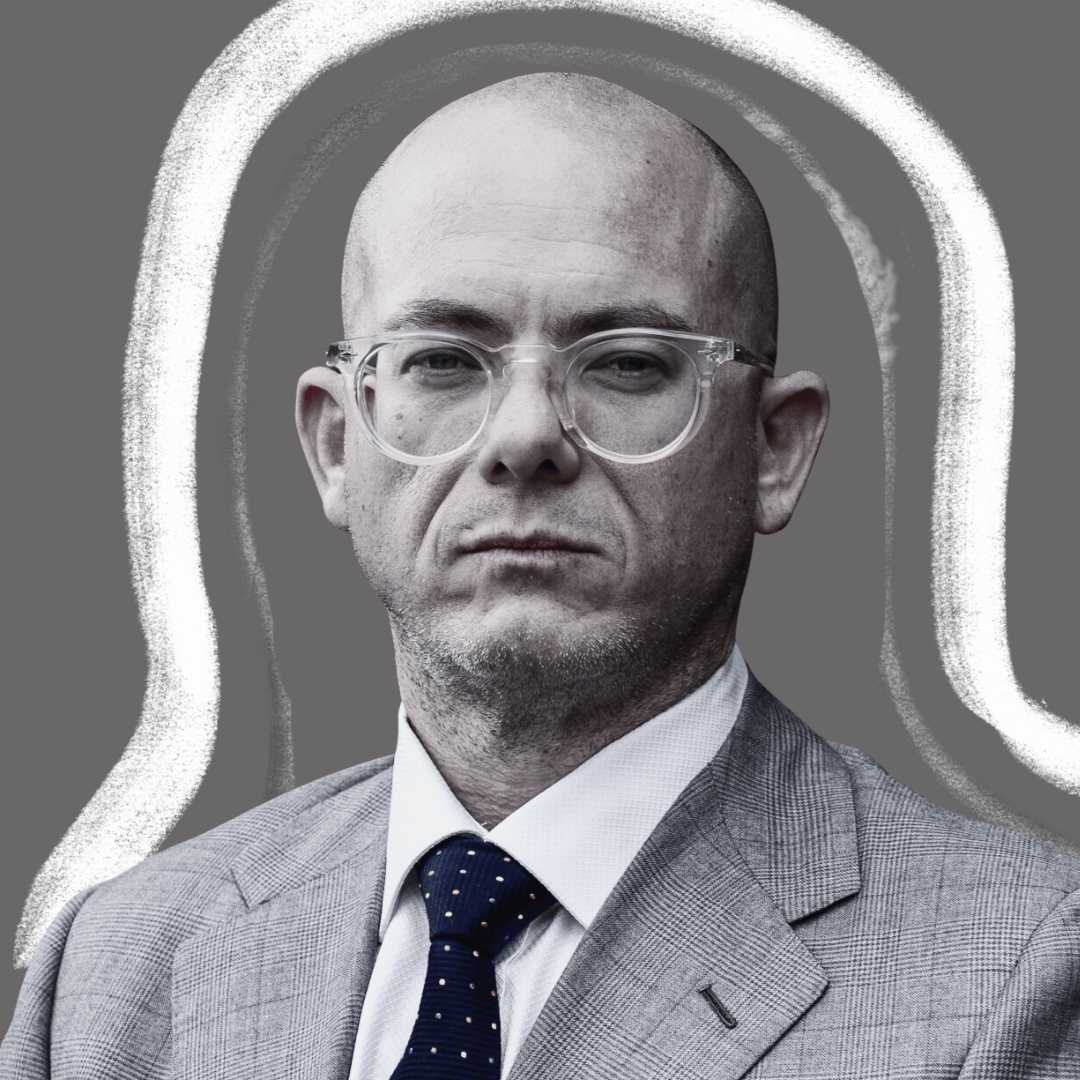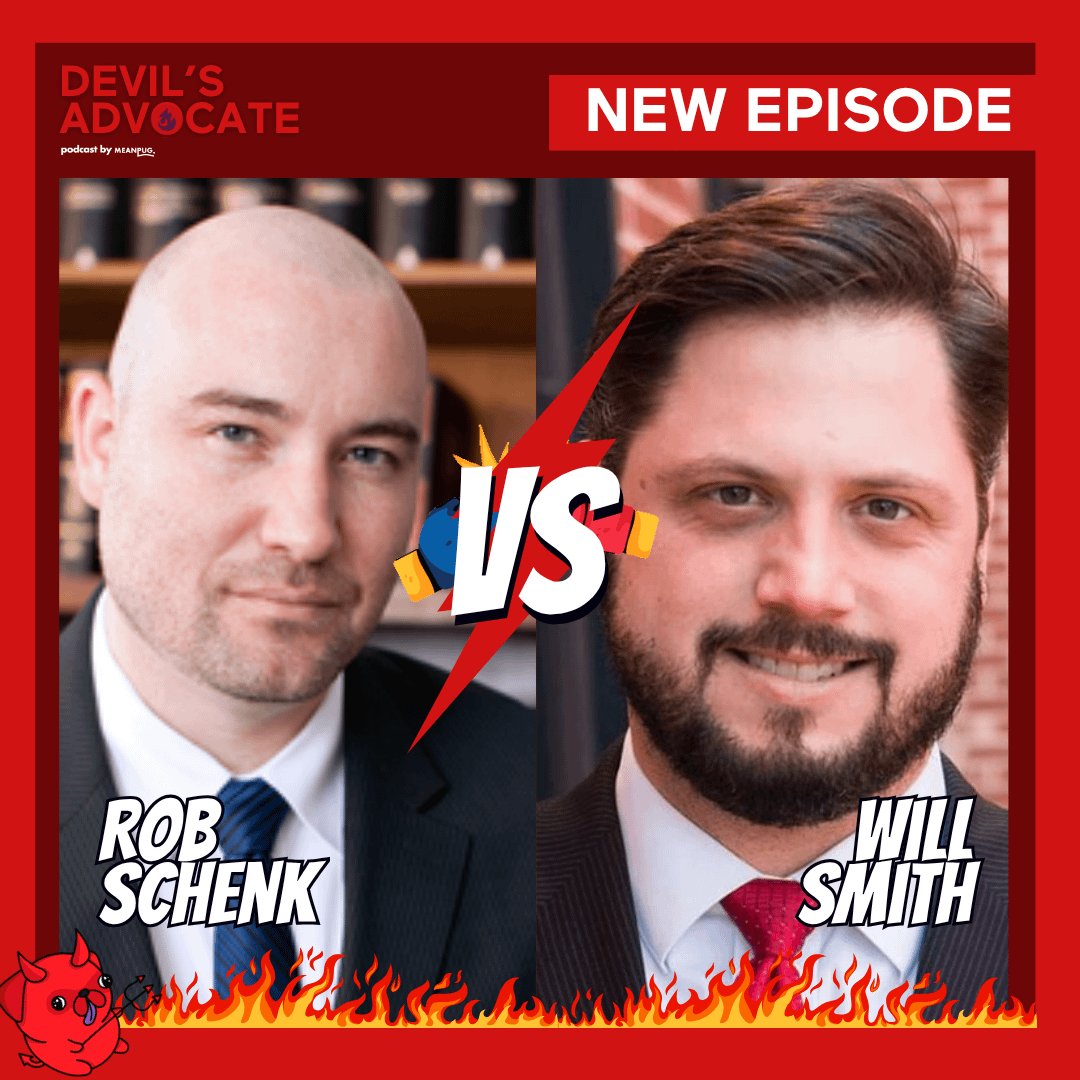
Episode Overview
Coming Up On This Premiere Episode of Devil’s Advocate by MeanPug:
Wheel of Misfortune
The debut of our brand-new legal torture device: spin the wheel, get a word, and argue your opponent’s made-up definition. This week’s word? Dravish. Fake? Definitely. Hilarious? Also yes.
Hot Topics with Cold Takes
Should sex work and marijuana be legalized? Morris and Eric trade sides, defend positions they’d never touch in real life, and somehow manage to sound almost convincing.
Mandatory Voting
Does democracy work better when you force people to show up? Both attorneys go full dystopian and full idealist—all in the same 10 minutes.
Episode Links
Want to hear more from elite lawyers and industry-leading marketers?
Follow us on Social Media for more
Episode Topics
– Is the death penalty an effective deterrent?
– Are plastic straws the real villain?
– Is the medical malpractice system broken or just misunderstood?
– And should you ever settle a case when you could just trial-by-fire it?
– Football metaphors and Tesla analogies included at no extra charge.
Episode Transcript
[00:00:00] Narrator: Welcome to Hell. Devil's Advocate, pits lawyer against lawyer in Battle Royale to answer the age old question. Who's better at arguing? The rules of the game are we spin the wheel of this fortune to decide on a topic once a topic has been selected. The advocates must answer a set of polarizing questions. [00:00:23] Narrator: When they disagree, the game begins. Each advocate must argue their side, but here's the devilish twist. They must argue for the side they did not select. Let the depravity commence. [00:00:44] Bobby Steinbach: Hey everybody and welcome to Devil's Advocate. Uh, today we've got a very special episode. We've got Erik Heninger and Morris Lilienthal with us. Sorry if I butchered your names, gentlemen, but, uh, it's gonna be a good one. [00:00:56] Andrew Nasrinpay: Yep. Let it begin. [00:00:57] Bobby Steinbach: Yep. Let it begin. [00:01:03] Bobby Steinbach: Uh, yes, it's all you. [00:01:05] Yitz Shapiro: Alright, let's spin. [00:01:11] Yitz Shapiro: Ah, so we're starting off with game. The game is, you need to argue about what this made up or real word means. Each of you gives your own definition. The must argue why the other's definition is the right one. The word is D. [00:01:27] Erik Heninger: Ah, D sounds like, uh. A lawyer that is disheveled, uh, unkempt, unknowing and just, uh, generally not a well looking [00:01:39] Morris Lilienthal: fella. [00:01:39] Morris Lilienthal: Drag is just means you're not cool. It's kind of like you're lame, you're boring. It's kind of what the kids are saying, man, he is damn draggish. I would not hang out with him. F Fun. [00:01:50] Bobby Steinbach: All right guys, so Morris, now it's your job to argue why Jish means it's a lawyer who's stuffy and all the things that Eric said. [00:01:59] Bobby Steinbach: Eric, you're job is to argue why DAV is kid. Basically kids saying it's not cool. It's like all the rage for the kids these days and begin. [00:02:11] Erik Heninger: Yeah, I think Morris, you may have a good definition there. Drab, it sounds like a word that my. 13-year-old came up with an elementary school who is using in middle school Rish. I think it's perfect because, you know, the older folks don't have any idea what it means. We probably embrace Rish, which would support the whole idea that we're not cool. [00:02:28] Erik Heninger: At least that's the way it works in my house. [00:02:31] Morris Lilienthal: Well, Rish really means, you know, it's kinda like a defense lawyer just stuffy, always get, always, uh, standing in front of a brick wall or, you know, just kind of wanting to just, you know. Just needle knows you about everything. Can't do anything easy. [00:02:44] Morris Lilienthal: Everything's a pain in the tail. You can't get anything free communication, they're always trying to hide everything. They're just DI mean that's, that's all there is to it. I just think of a big firm defense lawyer at one of these big firms and they're defending Ford or you know, some other big conglomerate or Tesla, you know, they're drive. [00:03:03] Bobby Steinbach: I [00:03:04] Morris Lilienthal: think they [00:03:04] Bobby Steinbach: made some good points. Let's move past the game. The game is usually the last thing that we do. [00:03:11] Yitz Shapiro: Alright, so let's spin again. [00:03:18] Yitz Shapiro: Question is, or the point is, sex work should be legal. These are, yes. No. By the way, for the record, [00:03:27] Erik Heninger: yes, I want Morgan, I mean, I want Mo to have to answer this question. [00:03:34] Morris Lilienthal: Well, yes, I think I think so too. I think if, if you can just like anything else, we can regulate it, so why not legalize it? [00:03:42] Yitz Shapiro: Alright, so no game. Alright, next question. Okay. Should marijuana be legalized nationwide? [00:03:50] Bobby Steinbach: Yes. No. Okay. All right, gentlemen, make your arguments. [00:03:55] Erik Heninger: Uh, since I'm gonna argue in for, uh, for MO'S answer, uh, no, it shouldn't be regulated. [00:04:00] Erik Heninger: 'cause I think different states, uh, have different personalities. They have different citizens and they have different values. So why, in part, you know, a, a national idea of drug use upon, you know, I, I don't want to do in Alabama what they're doing in California. I wanna be different. I wanna be, I wanna hold to my values, my whole hold, my southern values, my Christian values and marijuana use just. [00:04:24] Erik Heninger: Eviscerates, all of those things. [00:04:26] Morris Lilienthal: Why should a state line make a difference in whether something's legal or not legal? I mean, that's crazy and, and do, I mean, think about all the other crazy things that we're doing and we're regulating, we're taxing right now and things I can tell you, I've been a lot more intoxicated in seeing a lot more people dangerous by intoxication than by marijuana. [00:04:47] Morris Lilienthal: And so, you know, we just need to tax it, regulate it. Let's bring in the tax dollars. It's like the equivalent of having a lottery in Tennessee and everybody in Alabama going over to Tennessee to buy the lottery tickets. And then, but we don't want to have it here. We're too good. We don't think we're out going to Colorado and these other places smoking dope and then we just don't want to have it here. [00:05:07] Morris Lilienthal: That's crazy. [00:05:08] Bobby Steinbach: Anything else from either side? [00:05:10] Erik Heninger: Mo our religious nature is crazy, so we can't have people smoking. Let them go to Tennessee, let them go to Colorado. They belong there. Don't come back. [00:05:19] Morris Lilienthal: No way. No way. We're, we're leaving too much on the table. We should, we should be, we should be free flowing that. [00:05:25] Morris Lilienthal: Think about all the cells. Uh, don't we need, uh, a bunch of, uh, you know, more stores in our strip malls for selling bud and weed now? So that's what we need. Alright. Yeah. Why don't you move me [00:05:35] Bobby Steinbach: over to Morris. Yeah. I'm getting pushed over. Andrew's still on the fences. [00:05:40] Andrew Nasrinpay: Yeah. I'm gonna stay on the fence here. [00:05:42] Bobby Steinbach: All right, let's move to the next, next category [00:05:48] Yitz Shapiro: society. So the first point of argument or contention is plastic straws should be banned from restaurants. [00:05:58] Morris Lilienthal: No, [00:05:59] Yitz Shapiro: no. Next one is global warming is the single biggest. Threat facing society today? [00:06:06] Morris Lilienthal: No. No, no. Okay. [00:06:10] Yitz Shapiro: And next one is, should voting be compulsory? [00:06:14] Erik Heninger: Yes. No. [00:06:20] Erik Heninger: Alright. And voting should not be compulsory. Uh, you know, uh, too many citizens, uh, are not aware of the issues of the impact and, and qualifications of candidates. So requiring people to vote on something they have no idea about is just dangerous. That's how you get officials that are, or that's how you get elected officials that shouldn't be in office, in office. [00:06:42] Erik Heninger: And then it's just travesty all the way down. It becomes, we start looking, Trish. [00:06:47] Morris Lilienthal: Okay. Great word. Well, I mean. Clearly, you know, we need to be voting and doing, and it's like everything else. We need to mandate that because once you mandate it, people are gonna get out there and they're gonna be required to get informed and do, are we just gonna sit on the sidelines and not let folks understand what the importance is? [00:07:06] Morris Lilienthal: That's kind of how we're in the position we're in now. And do we let the few dictate for the whole? And so I think we need to make it important and start it from the ground up, from the flow up and make sure that everybody understands. Why we need to be voting and doing, and if it's mandated and people are required to do, then I think we're in a better position to to know what's going on. [00:07:26] Morris Lilienthal: And you're not gonna be Travis, you're gonna be cool, cool, and hip. Oh, he also, and we're gonna have bud in our state because everybody's gonna get out and vote, [00:07:36] Bobby Steinbach: right? You both made some excellent, excellent dage points. So to the fence for both of you. Next category. [00:07:48] Yitz Shapiro: All right. So is the death penalty an effective deterrent against serious crimes? [00:07:56] Morris Lilienthal: Uh, yes. [00:07:58] Erik Heninger: No, [00:08:03] Erik Heninger: it's not a good, it's not a deterrent to, uh. To, to severe crimes. I mean, you're, uh, you're, you're, people don't even realize what the laws are. They regularly don't realize, you know, what the severity or what they increase the severity of their, of their actions. What's that gonna do? Um, and I'm a lawyer and I, I don't even know all the consequences to. [00:08:24] Erik Heninger: To the laws that we have. Is it, you know, if you walk around with a gun, it's more severe than you walk around with a knife. It doesn't make a lot of sense. Um, I think the death penalty, uh, costs too much. It's too cumbersome to, uh, for our society to actually use. Um, it just takes too long. So I, I don't think it's an effective, uh, cure for, uh, the severity of crimes in this country. [00:08:48] Morris Lilienthal: Well, I think it's like anything else. We, we, we've got to, we gotta have the right penalties out there. To restrict, uh, types of conduct and do, and um, I think what we have is, uh, kinda like rom white, white say in Texas, you know, in Texas they have a fast lane for the death penalty. Maybe we need to, we need to fast track these things. [00:09:06] Morris Lilienthal: You know, you hear about, we used to hear stories several years back where people would go to another country and. They would be, uh, they chop their arm off or something crazy for, for, for stealing and doing. I don't think we are putting enough out there for people to understand. We are just putting people in jail and they're just sitting there the entire time and we're not processing people through properly that are committing these kinds of crimes because if people really. [00:09:33] Morris Lilienthal: Understood the impact and they, and we were imposing the death penalty, not just issuing the sentences but actually imposing it. I think it would have an impact. There's no doubt about it. [00:09:43] Bobby Steinbach: Maurice, to your point about chopping the arm off, that sounds very like Code of Hamish. I. Would you say that that, wouldn't that mean that we're going backwards? [00:09:51] Bobby Steinbach: Like what would you say to people saying that puts us like going backwards and not moving forwards? [00:09:58] Morris Lilienthal: Well, I mean, again, I'm not advocating that we should do that in our country, but when we hear about a deterrence, we're talking about what can we do as a deterrent? And if I'm. Taking a pro death penalty approach here, then I think we need to make sure that the penalty is not only out there, but it's one that is put into place. [00:10:17] Morris Lilienthal: Because right now how many people are put to death in a, in Alabama where, where Eric and I are, are in the country, I. Probably just a handful. So it's not really a deterrent just because it could happen. It's like telling my 14-year-old, I'm gonna take your phone away. I'm not taking his damn phone away because it's more of a pain in the ass to me than it is for him to take his phone away. [00:10:35] Morris Lilienthal: 'cause I can't keep up with him. I can't deal with what I gotta deal with on a day end out basis. So, you know, we gotta understand that what, what the real threat is versus an actuality. And so it needs to be an actuality, not just a threat. [00:10:47] Bobby Steinbach: So if it's just for the purpose of being a deterrent is, would, should we torture instead of just like a silent, like a quick death? [00:10:54] Bobby Steinbach: Should we torture people in? Like, [00:10:56] Morris Lilienthal: I don't, I like tortures and defense lawyers, but Yeah. Um, I think, um, you know, I, I don't know. I don't know about torture, but we're talking about, I think the crime needs, the punishment needs to meet the crime here. And so if it meets a certain threshold, then once someone's had their appeals processed, then we need to effectuate that outcome. [00:11:16] Morris Lilienthal: As opposed to dragging it out and dragging it out, and that's what's going on right now. And so it's not a real effective punishment because it's not a real threat. Okay. You want me over? [00:11:26] Andrew Nasrinpay: Yeah, you can move me over too. Yz. Unless we get a, uh, a strong rebuttal here. [00:11:32] Erik Heninger: Yeah, I'm glad Morris mentioned Alabama, where we live 'cause we're a little bit more cognizant of the things that we're having to deal with here, here recently in Alabama. [00:11:39] Erik Heninger: I think we've probably, uh, put to death more people in the last two years and maybe any other state in the country. And yet here where I sit in Birmingham, severe crimes have gone through the roof. We've had the highest number of murders that we've ever had in Birmingham in the last. 50 years and we're utilizing death penalty more than we ever have been before. [00:12:00] Erik Heninger: So the numbers don't add up. It doesn't make any sense. So that's just proof positive and clear evidence. That's hard to argue with that it's just not effective. [00:12:10] Morris Lilienthal: You know, it's percentages or anything we want to make 'em to be. If, if we put four people to death, is, is that, that may be twice as many if other com other states have put two people. [00:12:18] Morris Lilienthal: Yeah. So, um, I, I, I'm not sure that I've, I've, I've heard a lot of that, but I, I do agree there's, there's a high crime rate in Birmingham, so I've been around a lot of places we need to effectuate means and, and put it in place to stop it. [00:12:32] Bobby Steinbach: Alright, let's move to the next category. Let's get off death. Alright. [00:12:37] Bobby Steinbach: Something happier. Hopefully not the game again. [00:12:42] Yitz Shapiro: Ah, [00:12:42] Bobby Steinbach: pi. Okay. [00:12:44] Yitz Shapiro: Should be familiar territory. Alright, so should you take cases to trial that may settle early for a reasonable sum or for the sake of keeping the attorney sharp and insurance companies honest, [00:12:57] Morris Lilienthal: actually go to trial. Nah, you, you should settle, [00:13:00] Bobby Steinbach: begin. [00:13:04] Morris Lilienthal: So you, you gotta take that side. Eric, I think you flipped on me last time. I think. I think you said the other way and you still took the other position. [00:13:10] Erik Heninger: Did I? Yeah. Well, it's devil's advocate. I'm the devil. [00:13:18] Erik Heninger: All right, so I, I gotta argue that you would used to settle cases and, and I can see some logic there because settling a case early, uh, is probably, well in some cases would be better for the client because it gets over quickly. You know, you put some money in their pocket. Uh, and they can move on with their life. [00:13:35] Erik Heninger: Start the next chapter. Um, so I think the, there's an opportunity there that this, the lawyer that's handling the case from the plaintiff's side should really take a hard look at settling a case early. Also, you know, unfortunately what we're seeing more and more in this state, I know in the south, probably in the country, is the quality of trial lawyers is decreasing, seems like on a yearly basis. [00:13:58] Erik Heninger: So. Fewer and fewer opportunities for a plaintiff to really take advantage of a, a trial opportunity where they can maximize the value of their case. So it probably would be smart on a broad scale if you settled a case early. [00:14:12] Morris Lilienthal: You know what I can tell you is, is that nine times out 10, once you file suit, the litigation process is going to uncover some fact, some piece of evidence. [00:14:23] Morris Lilienthal: Something out there is gonna develop that's gonna maximize the value of that case that you never would've known about had you sat and just sent in a demand package and gotten the, gotten a settlement offer in I'm, I'm in depositions yesterday without going into the facts of the case, this was something that I never would've dreamed we would've found out that this. [00:14:43] Morris Lilienthal: Multi, uh, international corporation is doing with regards to how they're handling something. And if we just sat on our tail, sent in a demand package and said, send us some money, and the client probably would've been okay with it, but now we're going to multiply his recovery many times over because we dug in, put our, uh, hand in the dirt, like I would say is playing football. [00:15:05] Morris Lilienthal: And we went to battle with the other side in Duke. Um, there's no question, nine times outta 10. Uh, you gotta do it. And Eric's point, sometimes there are times when you have facts that, uh, or a client, for whatever reason, that dictates settling cases on the front end is better. But for the large part, always fall suit. [00:15:24] Morris Lilienthal: Go after 'em, get all the facts, and then you can make the decision the best way to go forward. [00:15:29] Bobby Steinbach: And do you think that one side or the other leads to potential misuse of the system? Is there like settling early versus uh, going to trial in the case where it could have settled early? Does one of those two things bog down the system unnecessarily? [00:15:46] Erik Heninger: I think it bogs down the system unnecessarily. Absolutely. Um, you know, all you doing when you file a case and take it to trial is lying the pockets of the defense lawyer. And that's really all you're doing. Um, you may be able to get more money for your client, but the time spent and the aggravation spent of dealing with that defense lawyer, uh, just seems to suck the life out of you and, and in fact, sucks all the money out of the case. [00:16:13] Erik Heninger: So get, you know, get what you can. You know, you can be a good as good a trial lawyer as I am, and you make the other side afraid so you don't even have to file the lawsuit. So get the money up, up front. Make the client happy and move on to the next case. [00:16:26] Morris Lilienthal: Well, you know, you, you can huff and puff and you can say, we're the world's biggest injury law firm, and you can have NIL deals with all these players, but you gotta get in and you gotta know your facts. [00:16:36] Morris Lilienthal: It, it's all, it's all smoke and mirrors and doing. Um, you, you look at a lot of the college football teams now are smoking mirrors and doing, but when they get on the field, they can't, they can't cut the mustard and do, and if you continue to settle cases like that, you're running into the same insurance companies over and over again. [00:16:53] Morris Lilienthal: They know they can undercut you and under settle you. And you're not only, uh, screwing your clients, you're screwing yourself. And so it's, it's should be about the clients and getting the best recovery possible. You need to dig in, put your foot up their ass, and go forward. I'm back [00:17:09] Bobby Steinbach: on the, I'm very like wishy washy with my, no, [00:17:11] Andrew Nasrinpay: I'm, I'm on Team Morris for this one. [00:17:14] Andrew Nasrinpay: No, you didn't. You just didn't wanna move. [00:17:16] Bobby Steinbach: That was laziness. That was driven by laziness. Okay. Let's, uh, I think we got time for one more spin. All right. [00:17:26] Yitz Shapiro: Yeah. Again, should there be a cap on punitive damages in personal injury cases? [00:17:31] Morris Lilienthal: Holy cow. No. No. I can't even make you argue the other side of that one here comes dark. [00:17:40] Yitz Shapiro: Alright, should no fault insurance systems be adopted nationwide? [00:17:44] Erik Heninger: No. [00:17:45] Yitz Shapiro: Uh, should third party litigation funding be allowed in personal injury cases? [00:17:50] Morris Lilienthal: Yes. Yeah, I agree with that. Yeah. Cool. That was gonna be that one. [00:17:55] Yitz Shapiro: Alright. Is the current system for medical malpractice claims effective in protecting patients' rights? [00:18:00] Morris Lilienthal: Hmm. [00:18:02] Erik Heninger: I'll say yes. Just so more has to say no. [00:18:05] Morris Lilienthal: I'll say no. So I means I've got Yes on that side. Yeah. [00:18:12] Morris Lilienthal: So, you know, with regards to medical malpractice cases, you know. I think where the, the current system is effective because what happens is people are call our office all the time and I. What they're complaining about is a lot of times it's the doctor's bedside manner or it's the nurse's bedside manner and or it's just a complication and it's an unfortunate complication, but it is a complication and a risk inherent in the procedure that they're having. [00:18:41] Morris Lilienthal: So you know, every time that they're not, that they're upset with something, you can't file a lawsuit. And so the current law set it up such that you have to make sure that at least in our jurisdiction. That the doctor has breached the standard of care, and you have to have a similarly situated expert on the other side, uh, to, to show that they breached that. [00:19:02] Morris Lilienthal: And I think that is critical because we need that protection for our doctors or people are gonna be scared to go into the profession and do, and people have to understand that a bad outcome is not necessarily malpractice. And every time they're upset because somebody's rude or short with 'em, doesn't mean they got a lawsuit. [00:19:19] Morris Lilienthal: I mean, if I, if we dealt with that in other professions, escalate that out. Think about teachers get gracious if, if, if my wife teaches elementary school, if every time somebody moaned and complained to her about how she exercised or did something in her class, she'd be sued every week. It's ridiculous. [00:19:36] Morris Lilienthal: The system needs to be tight and strict because there are not that many situations where a doctor is, uh, in breaching the standard of care. Are they out there? Yes. Should they be held accountable? Yes. But the most part, uh, and Eric will tell you that that's why nine times outta 10 when he evaluates a malpractice case, there's no malpractice. [00:19:57] Morris Lilienthal: So the system is there and it's there for a reason. [00:20:00] Erik Heninger: Oh, Morris, I'm glad you had to argue that side. You know, we do need our doctors. And last time I checked, uh, medical schools here in this state, there's no glut of doctors. In fact, here in Birmingham, UAB hospital and the health system is the largest employer in the whole damn city. [00:20:15] Erik Heninger: So. We got tons of doctors. We've got tons of nurses. Now here's the reality of the situation. Yeah, I do have to turn down nine outta 10 cases that come to my office. That's because the law is so bad. It protects doctors, it gives them the advantage. They're the ones going in and they are not paying any attention to the client or they're patient, they're not listening to the nurses. [00:20:35] Erik Heninger: You got everybody specially specializing from, you know, I only work on toenails, or I only work on hair, and everything in between. Nobody knows what the other one's doing. And when they go in and they screw up and they do screw up and they screw up often, and it's always serious. It's not just a little complaint mode. [00:20:52] Erik Heninger: They're not just saying, oh, I didn't get the flavor ice cream that I wanted after my tonsillectomy. It's the fact that I went in for a tonsillectomy and now I don't have an esophagus. And so the law there protects the doctor's screw up. Oh, and here's the bigger thing. You got a doctor that can't even determine what's a liver and what's a kidney. [00:21:11] Erik Heninger: And the public doesn't know about it. So he's still operating here in one of our hospitals, screwing people up. And yet the law protects him and it's to the disadvantage of the patient. So no, this law isn't working. It doesn't inform the public about how bad some of the, the medical care is. It's a tragedy. [00:21:30] Erik Heninger: We got serious people that are really, really hurt and can't get compensation and that just puts more of a burden on the taxpayers. 'cause they're getting Medicare and Medicaid now. And who's paying for that? You and me, Mo. And so it should be the responsibility of the doctor who caused the injury. Uh, not us, [00:21:45] Morris Lilienthal: but nobody's arguing that if, if, if you're, if you're, if you're taking out somebody's kidney and you're supposed to be re removing their liver, that shouldn't be a case. [00:21:53] Morris Lilienthal: We're talking about our, we should we open up the floodgates? Of people every time they have a complaint about a poor outcome and a surgery to open up, it make it much easier to file a medical malpractice case. Let's see what happens when we do that. And let's see that the UAB health system and the number of doctors dwindle down and nobody wants to go into that profession. [00:22:13] Morris Lilienthal: I'm telling you that the, the litigation will be enormous if we make it much easier to do. It's, it's just ridiculous if they're chopping off the wrong arm or the wrong knee. Got it. But otherwise we need the deterrent there because nine times out of 10 when people are fussing, it's just because somebody's bedside that manner. [00:22:31] Morris Lilienthal: They didn't get their name out. [00:22:33] Erik Heninger: Yeah, you're right. If, if we do open the flood gates, people will be sued and hopefully it'll get outta the state and stop. Stop treating our, our citizens. Let them go to California or Texas and treat people. They don't need to be here. We all right. I'm back on the fence. [00:22:46] Bobby Steinbach: Lot of good points. [00:22:48] Bobby Steinbach: Okay guys. Uh, that is it on our game for today. Thank you both for joining. I landed on the fence at the end, I guess Andrew's team, Eric. [00:22:58] Andrew Nasrinpay: Oh, for the final argument. Yeah. I don't know what the total tally is that Yeah, we come up, we to tally to do a total tally type [00:23:04] Bobby Steinbach: of thing. But, um, overall I think. I'd be, uh, very happy if either of you guys were my lawyer, if I ever needed it. [00:23:11] Bobby Steinbach: So thanks again for joining and um, we'll see everyone on the next episode of the Hot Docket. Oh, sorry. No, this is devil's advocate. I gotta get outta that habit. [00:23:22] Rita Richa: That wraps it up for our devil's advocate game, so it's time to pick our winner. Well, while Bobby was on the fence for most of the time, there was one defining boat that made. Congratulations to Eric, our winner, but we would love to hear from you. Who do you think was the winner? Have any ghoulish guest ideas or hair raising topics you think we should debate? [00:23:43] Rita Richa: Leave a comment and let us know, and thank you so much for watching Devil's Advocate.










